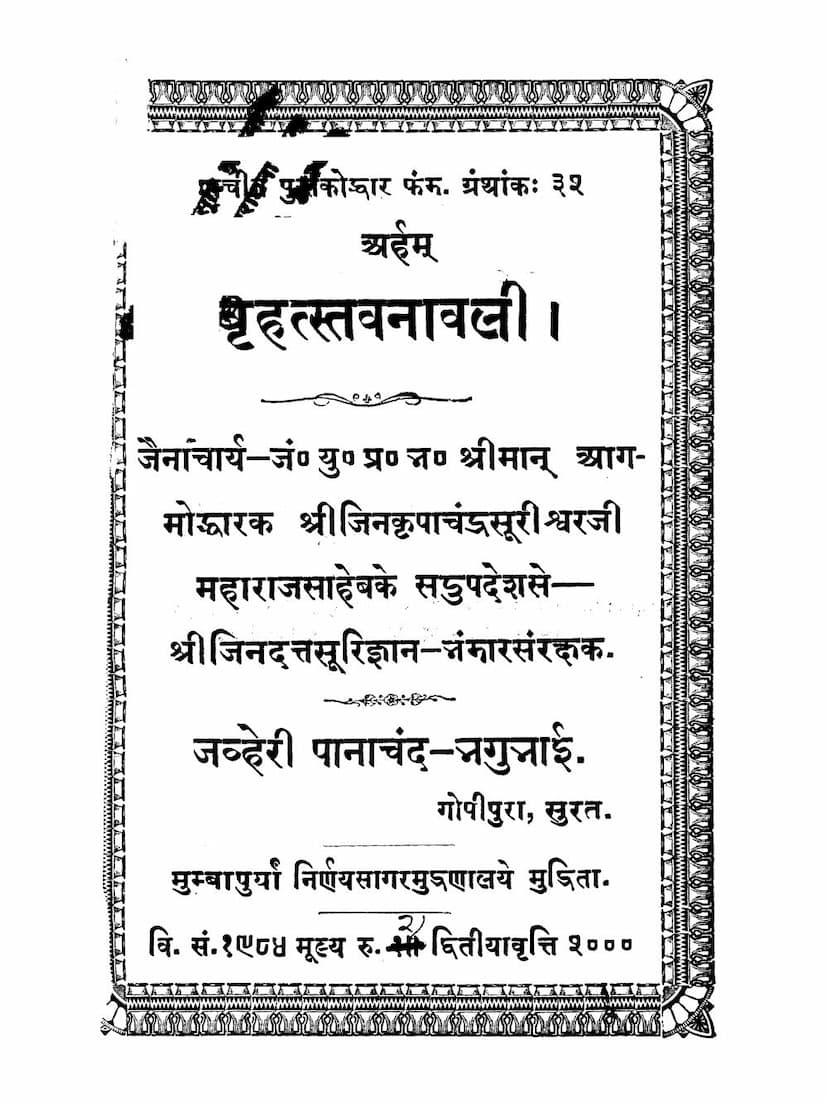Bruhat Stavanavali
Added to library: September 1, 2025

Summary
The book "Bruhat Stavanavali" (बृहत्स्तवनावली) compiled by Bhagubhai Panachand Jhaveri and published by Bhagubhai Panachand Jhaveri is a vast collection of Jain devotional hymns, known as Stotras or Stavans, composed by various revered Jain Acharyas and scholars. The catalog link provided suggests a collection of over 170 hymns covering a wide range of subjects relevant to Jainism.
Here's a comprehensive summary based on the provided text:
1. Title and Author:
- Title: Bruhat Stavanavali (बृहत्स्तवनावली) - meaning "Great Collection of Hymns."
- Author/Compiler: Bhagubhai Panachand Jhaveri.
2. Publisher:
- Bhagubhai Panachand Jhaveri.
- The text mentions it was printed at the 'Nirnaya Sagar' Press in Bombay.
3. Content Overview: The book is a comprehensive anthology of Jain devotional poetry, primarily consisting of Stotras (hymns) and some Sajjhayas (narrative devotional songs). The detailed index provided across multiple pages reveals the immense scope of the collection. It features hymns dedicated to:
- Tirthankaras and Jinas: Hymns praising various Tirthankaras (like Rishabhdev, Shreyansnath, Parshvanath, Mahavir Swami, Neminath, and the twenty-four Tirthankaras in general) and their divine qualities.
- Other Deities and Revered Figures: References to Jinasasan, Upadhyay, Sadhus, Gurus, and possibly celestial beings.
- Jain Principles and Concepts: Hymns explaining and glorifying core Jain tenets such as Navatattva (nine realities), Panchamit (five samitis), Triratna (three jewels), Karma, Moksha Marga (path to liberation), and various vows (Vratas).
- Sacred Places and Pilgrimage: Mention of pilgrimage sites like Mount Shikharji, Pavapuri, and Mount Girnar, with hymns dedicated to their significance.
- Religious Practices and Observances: Hymns related to Pujas, Upadhan Tapa, Paryushan Parva, Diwalia, and other Jain rituals and festivals.
- Philosophical and Ethical Teachings: The collection includes hymns on topics like detachment (Vairagya), ethical conduct, the nature of the soul (Jiva), and the importance of knowledge and right conduct.
- Specific Events and Stories: Some hymns appear to narrate stories from Jain scriptures or the lives of saints and kings.
- Astrology and Auspicious Times: The text also includes hymns and references related to auspicious days and times, such as the significance of the full moon (Purnima) and specific days of the month (Panchami, Ekadashi).
4. Key Themes and Subject Matter: The collection aims to provide a spiritual resource for devotees, covering a wide spectrum of Jain devotional practice and philosophy. The hymns are designed to inspire faith, devotion, ethical living, and spiritual progress. The sheer volume of hymns suggests a deep engagement with the devotional and spiritual heritage of Jainism.
5. Structure and Organization: The book is meticulously organized with an index listing hymns by their serial number (Granthanka), subject matter (Vishay), author's name (Karta nu naam), and page number. This structure facilitates easy navigation and access to specific devotional pieces.
6. Editorial and Publishing Information:
- The second edition (Dititya Vritti) was published to meet the high demand, indicating the book's popularity.
- The text mentions the inspiration and guidance of Acharya Yugpradhan Ganadhipati Shri Jinakripachandra Surishwarji Maharaj Saheb for the publication.
- Financial contributions from individuals like Shrimati Sushravika Shri Kamalabai and Shrimati Jamavbai are acknowledged, highlighting the community support for this endeavor.
- The preface also mentions the meticulous work of Jaina Acharya Shri Jinakripachandra Surishwarji Maharaj Saheb and Anand Muni Ji in compiling and ensuring the accuracy of the collection.
- The book emphasizes the correction of errors from the first edition and the inclusion of additional hymns, making the second edition more comprehensive.
- A mention of the catalogue number (Granthanka: 33) suggests it's part of a larger Jain literature collection or library.
7. Significance: "Bruhat Stavanavali" serves as a valuable repository of Jain devotional literature, offering a rich source of spiritual inspiration and guidance. It reflects the tradition of devotional poetry within Jainism, which plays a significant role in religious practice and the transmission of spiritual knowledge. The extensive nature of the collection underscores the depth and breadth of Jain devotional traditions.
In essence, "Bruhat Stavanavali" is a monumental work within Jain devotional literature, offering a comprehensive collection of hymns for the spiritual edification of the Jain community.